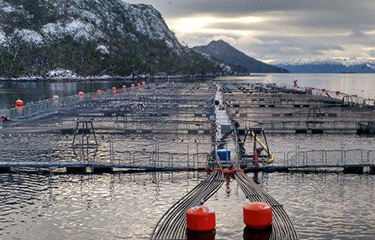Chile Sub-Secretary of Fisheries and Aquaculture (Subpesca) has cut salmon farmer Nova Austral’s production permits after it was discovered the latter gave false mortality figures.
Subpesca issued a resolution reducing farm density from 17 kilograms to 13 kilograms per at three centers for salmon farming concession group 54A, belonging to Nova Austral in Chile’s Magallanes region.
In Chile, salmon farmers are required to reduce stocking if mortality surpasses 15 percent.
Nova Austral – which prides itself in providing sustainable, antibiotic-free products by harvesting salmon in the cold waters of Southern Patagonia – has faced scrutiny since June, when Chilean press reported an attempt to manipulate the company’s reported mortality rates. In response, Sernapesca, the country’s fisheries and aquaculture regulator, filed three complaints against the company for knowingly misleading authorities through false reporting of information, and the Aquaculture Stewardship Council terminated a logo licensing agreement on all of Nova Austral’s products while it carries out its own independent investigation. The company fired CEO Nicos Nicolaides in July, referring to “certain irregularities” in the information provided to Sernapesca.
“Nova Austral does not compromise its standards of production, antibiotic-free product integrity, sustainability, and environmental commitment for which it has been recognized internationally,” it said at the time, highlighting its near-completion of the USD 45 million [EUR 41.1 million] hatchery in the Magallanes region designed to improve smolt quality and normalize mortality rates.
Earlier this month Chile’s Superintendency of the Environment (SMA) also announced it will begin sanctioning proceedings against Nova Austral for environmental damage the company caused at four salmon-farming sites in the Magallanes region, citing evidence of overproduction, waste mishandling, inadequate mortality management, breaches in its silage platform allowing runoff, and lacking mandatory equipment to comply with rules pertaining to algal blooms and fish escapes.
A U.S. law firm, Ropes & Gray, was hired by Sernapesca to investigate mortality figures at Nova Austral farms in the wake of newspaper stories alleging that the salmon farmer had submitted fake mortality figures. That firm corroborated the allegations in the newspaper story.
“Our investigation confirmed that in some instances the company misreported mortality rates to Sernapesca to keep below the 15 percent threshold and avoid stocking reductions, the benefit of which largely has not been realized to date,” Ropes & Gray anti-corruption lawyer María González Calvet was quoted as telling investors. “Some employees also reported a related practice of deflating stocking numbers when smolt were delivered, to give the company a buffer in the mortality rate calculations.”
In addition, the company has lost its permission to farm in a fjord in southern Chile, according to a story in The Guardian. That, coupled with the regulatory cut of stocking permitted is expected to hit Nova Austral’s production. In a September 24 updated harvest guidance, the company said it expected to register 18,000 to 20,000 metric tons (MT) next year.
That compares to 23,000 MT it expects for 2019, which was adjusted at the beginning of September from the 30,000 MT it predicted at the start of the year.
According to the 2018 report from the United Nations' Food and Agriculture Organization (FAO), “The State of World Fisheries and Aquaculture (SOFIA),” Chile is expected to increase its fishery/aquaculture exports to 2.1 million tons by 2030, 56 percent above 2016 levels, making it the largest fish exporting country in Latin America and the Caribbean.
Photo courtesy of Chile Superintendency of the Environment







